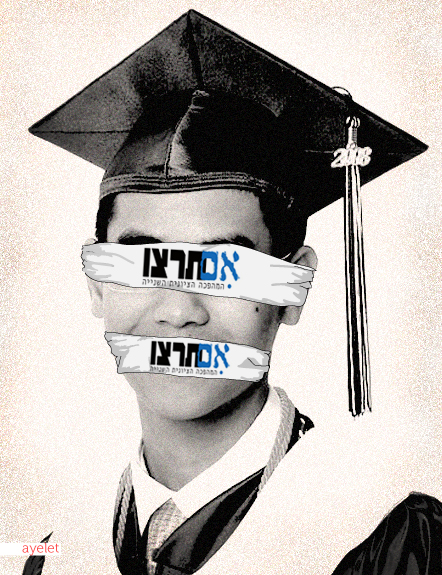Zochrot held a training seminar for educators who wish to teach the Nakba in school. It was held at the Bezalel Academy for Art and Design, Gallery 23, Jerusalem, and was very successful. After the seminar, Ronen Shuval, chairperson of 'Im Tirtzu (the second Zionist revolution) wrote to Bezalel and to government ministers demanding “not to repeat this failure". Bellow are Shuval’s letter and Zochrot’s response, which makes clear not only that this "failure" will be repeated, but that it will flourish as it did on this year’s Nakba Day.
Im Tirtzu
29 Tammuz 5772
July 19, 2012
To:
Mr. Gideon Saar, Minister of Education
Mr. Yuval Steinitz, Minister of Finance
Mr. Avigdor Lieberman, Minister of Foreign Affairs
M.K. Dr. Einat Wulf , Chair, Knesset Education Committee
Dr. Shimshon Shoshani, Deputy Chairman, Council of Higher Education
Prof. Arnon Zuckerman, President, Bezalel Academy of Art and Design
Re: Informational seminar for teachers about the Nakba organized by Zochrot, under the auspices of Bezalel
We wish to call your attention to apparently illegal anti-Israel activity planned to take place at “Bezalel.”
A seminar for teachers and students is being held today and tomorrow, 19-20.7.12, at the Bezalel Academy for Art and Design in Jerusalem. The seminar is led by Zochrot which supports and acts to promote a purported “right of return.” You, who bear responsibility for setting the tone of the educational system, should be aware of the activities of those whose goal is to undermine the legitimacy of the State of Israel as a democratic, Jewish state.
The organizers’ publications describe the seminar as follows:
“The training will introduce participants to some of the units included in “How do you say Nakba in Hebrew?,” a unique study guide about the Nakba for use in Israel’s Jewish educational system. It will discuss the pedagogy of teaching the Nakba in the Israeli school system.” “We’ll use the study guide to learn about the Nakba and the Palestinian refugee community, the relationship between dominant and silenced history, the right of return, and more. We’ll employ texts and visual material, testimonies, workshops and a tour of a Palestinian locality destroyed during the Nakba.”
“During the training we’ll address those issues as well as question we as educators must confront when learning about the Nakba, including: How can we teach the Nakba and develop critical tools to build a bridge between the material and learning about the Nakba? How can we deal with the challenges, fears and questions about our identity that arise from learning about the Nakba?”
Unfortunately, Zochrot’s study guide, which by the way is fully funded by an array of foreign countries, is aimed at bringing about the refugees’ return and undoing the Jewish and democratic character of the state of Israel. In doing so they are using academic facilities in a manner inconsistent with the 2011 Budget Law (Amendment No. 40).
This is one more example in a series of subversive, anti-Israel activities that we have been warning about for some time, which continue to take place in official state institutions.
We ask you to fulfill your responsibility, to deal effectively with this serious occurrence and to issue clear instructions regarding this topic so that such events do not recur.
Sincerely,
Ronen Shuval, Chairman
Copies:
Members of the Knesset Education Committee
Members of the Council for Higher Education
Prof. Manuel Trajtenberg – Chairman, Planning and Budgeting Committee
Members of the Planning and Budgeting Committee
Media
Response by Liat Rosenberg, Director of Zochrot:
I am disappointed, but not surprised, by Im Tirzu’s letter. Zochrot was, in fact, established a decade ago to make Israeli Jews aware of their responsibility for the expulsions and destruction carried out in 1948 (the Nakba), and to implement the return of the Palestinian refugees on the basis of UN Resolution 194.
Awareness involves learning the facts about the Nakba and recognizing the injustice done to and continued repression of the Palestinians, as well as understanding that while the major events of the Nakba occurred during 1948 it was not a one-time trauma in the past but a process whose conclusion is not yet in sight.
Israeli Jews can accept responsibility for the Nakba and the issue of the Palestinian refugees after 1948 by coming to understand that implementing the return of Palestinian refugees, in addition to being an international moral obligation, would be neither a tragedy or another destruction of Israel, but would rather represent the hope of peace and reconciliation in our region. Moreover, it is a necessary condition for laying a solid foundation for establishing a true democratic regime in the country.
The continuing disregard of the Palestinian Nakba by part of the Israeli public and organizations like Im Tirzu, and, in particular, refusal to accept responsibility for it, makes it possible for the violent repression and the occupation to continue, making the Palestinians suffer, in particular, but also undermines the lives and security of Israeli Jews. More than this: it sabotages the possibility of a true democratic regime, one based on awareness, acceptance, responsibility and reparation.



